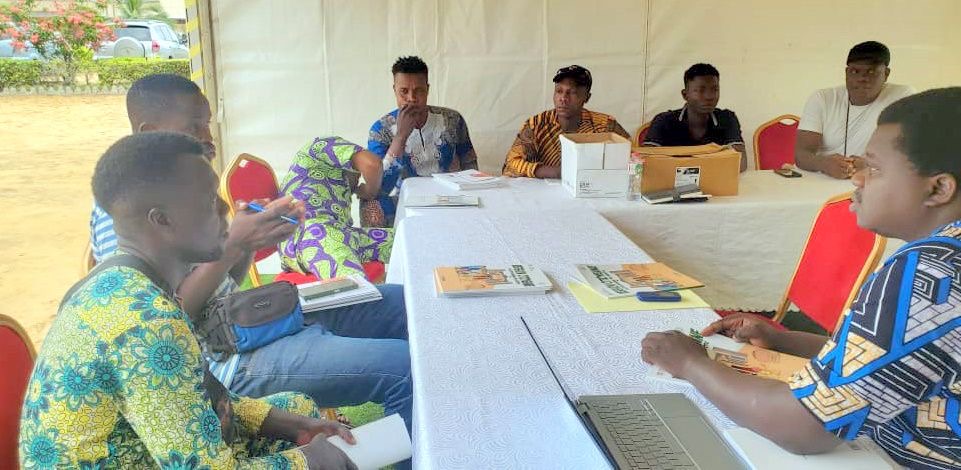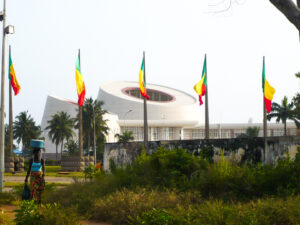Co-Creation in Action: How Benin is Making Budgets Work for People
La cocréation : un levier d’inclusion citoyenne pour une gouvernance budgétaire plus juste et plus transparente
A New Era for Public Finance in Benin
In Benin, participatory budgeting is no longer an abstract ideal, it’s a lived reality. Citizens are no longer passive recipients of public services. They are becoming co-creators of budget policies that shape their daily lives, marking a turning point in the country’s approach to governance, where transparencyAccording to OGP’s Articles of Governance, transparency occurs when “government-held information (including on activities and decisions) is open, comprehensive, timely, freely available to the pub... More and accountability are central pillars.
In November 2024, Benin took a major step forward by joining the Open Government PartnershipThe Open Government Partnership (OGP) is a multi-stakeholder initiative focused on improving government transparency, ensuring opportunities for citizen participation in public matters, and strengthen... More (OGP). A decision led by a Council of Ministers’, this milestone reflects the government’s deep commitmentOGP commitments are promises for reform co-created by governments and civil society and submitted as part of an action plan. Commitments typically include a description of the problem, concrete action... to openness and citizen participationAccording to OGP’s Articles of Governance, citizen participation occurs when “governments seek to mobilize citizens to engage in public debate, provide input, and make contributions that lead to m... More in public affairs.
Building on a Strong Foundation
Benin’s OGP journey didn’t begin in 2024. It builds on years of reforms and active participation in global platforms such as the International Budget Partnership (IBP), the Global Initiative for Fiscal Transparency (GIFT), and the Collaborative Africa Budget Reform Initiative (CABRI).
In 2012, Benin received a transparency score of just 1/100 from the IBP’s Open Budget Index. But rather than accept the status quo, the government launched a national effort to reinvent its budget governance. By 2015, those efforts had paid off, Benin’s score rose to 45/100, earning the country recognition as the world’s most improved reformer in budget transparency.
This momentum continued. In 2021, Benin achieved a score of 65/100, ranking as the top Francophone country in Africa and second across the continent. The progress is not coincidental but the result of deliberate strategies: the institutionalization of annual transparency action plans, the creation of citizen-friendly budget tools, and the introduction of digital platforms like BousProB that provide real-time access to budget documents and allow public feedback.
One game-changing reform came in January 2023, when the government transformed its budget transparency unit into the Open Budget Hub (Pôle Budget Ouvert), giving it a broader mandate to deepen citizen participation and integrate digital tools across the budget cycle. Out of Benin’s 17 budget stages, 13 now include formal entry points for civil society engagement, one of the highest ratios globally.
All of these efforts converge on a shared vision: to make public finances more transparent, responsive, and accountable.
Real-World Impact: From Transparency to Tangible Results
Reforms in budget governance are paying off. Domestic resource mobilization has surged, with tax revenues more than tripling in eight years, from 300 billion CFA francs to over 1 trillion. At the same time, Benin’s economy, experienced an average of 6.5% annual growth, well above the regional average, even in the face of global health, security, and climate crises.
These achievements underscore a simple truth: open governance isn’t just good politics, it’s also smart economics.
When Citizens Shape the Budget: Two Success Stories
1. Fixing the Textbook Gap (2021)
In 2021, the Ministry of Early Childhood and Primary EducationAccountability within the public education system is key to improving outcomes and attainment, and accountability is nearly impossible without transparent policies and opportunities for participation ... pledged to provide every first and second grade student with textbooks. On paper, the goal was met. But civil society groups, including Social Watch Benin and ALCRER, uncovered a very different reality: widespread shortages in schools.
A citizen-led oversight triggered an internal review, revealing serious underestimations in the needs assessment. Thanks to their vigilance, the textbook budget was increased from 280 million to over 1 billion CFA francs, ensuring that children received the textbooks they needed the following year.

2. Community Health Gets Funded (2023)
A three-year community health initiative, critical to reducing maternal and child mortality in rural areas, was at risk. Although donor-funded in its early stages, it was missing from the government’s 2023 draft budget.
CSOs stepped in once again, raising the alarm and advocating for its inclusionOGP participating governments are working to create governments that truly serve all people. Commitments in this area may address persons with disabilities, women and girls, lesbian, gay, bisexual, tr... More. Their intervention led to the creation of a dedicated budget line: “FADEC – Community Health”, initially funded with 1 billion CFA francs, this has now shifted to over 4.5 billion, supporting the work of 13,000+ community health workers.

Co-Creation: The Key to Effective Governance
These examples show the real-world benefits of co-creating public policies. When governments and citizens collaborate, policies become more accurate, more effective, and more trusted. Civil society doesn’t just identify problems; it helps fix them.
What’s more, this collaborative governance boosts confidence among international partners by ensuring greater transparency and accountability in how public funds are managed.
Looking Ahead: Shared Responsibility, Shared Progress
Benin’s open government journey demonstrates a crucial lesson: transparency is not the goal, it a means to an end. The goal is better governance, stronger institutions, and public policies that truly reflect the needs and aspirations of the people.
As Benin moves forward with its first OGP action planAction plans are at the core of a government’s participation in OGP. They are the product of a co-creation process in which government and civil society jointly develop commitments to open governmen..., the government is committed to sustaining this momentum. Together with citizens, civil society, and development partners, the government is building a future where budget decisions are made with, not just for, the people.
Une nouvelle approche de la gouvernance publique
Au Bénin, l’implication des citoyens dans les processus décisionnels relatifs aux finances publiques n’est plus une idée théorique ou marginale. Elle s’est affirmée comme une composante essentielle d’une gouvernance responsable et tournée vers les résultats. En permettant aux citoyens d’être non plus seulement des bénéficiaires, mais des co-auteurs des choix budgétaires, l’État renforce le lien de confiance avec sa population et améliore la pertinence de l’action publique.
C’est dans cet esprit que la République du Bénin a officiellement rejoint, en janvier 2025, le Partenariat pour un Gouvernement Ouvert (PGO ou OGP, en anglais Open Government Partnership). Cette adhésion, validée par le conseil des ministres, s’inscrit dans la continuité des réformes engagées en faveur de la transparence, de la redevabilité et de la participation citoyenne.
Une dynamique de gouvernance ouverte déjà amorcée
L’adhésion du Bénin au PGO ne constitue pas un point de départ, mais plutôt une reconnaissance des efforts déjà entrepris. Depuis plusieurs années, le pays a intégré plusieurs initiatives internationales, à l’image du Partenariat International pour un Budget Ouvert (IBP), de la Global Initiative for Fiscal Transparency (GIFT), ou encore de la Collaborative Africa Budget Reform Initiative (CABRI).
Toutes ces initiatives ont pour objectif commun d’accroître la transparence des processus budgétaires, de renforcer les mécanismes de participation publique et de garantir une meilleure redevabilité dans la gestion des ressources publiques.
Un cadre institutionnel consolidé
La réussite de ces engagements repose sur un socle institutionnel solide. Au Bénin, ce socle s’est renforcé au fil des années, notamment à travers la création du Pôle Budget Ouvert, une structure dédiée au sein de la Direction générale du Budget. Cette structure joue un rôle clé dans l’animation du dialogue entre les administrations publiques et les parties prenantes : organisations de la société civile (OSC), médias, secteur privé, élus locaux, et citoyens.
Ce dialogue se traduit de manière concrète dans l’élaboration du budget national. En effet, sur les 17 étapes que comprend le cycle budgétaire au Bénin, 13 offrent désormais des espaces formels d’interaction avec la société civile. Ce mécanisme d’inclusion est complété par des outils numériques, à l’image de l’application « BousProB », qui permet aux citoyens de suivre et commenter les différentes étapes du processus budgétaire.
Des résultats concrets : transparence et performance
Ces réformes ont permis de moderniser la gestion budgétaire, mais aussi de renforcer la confiance des citoyens envers l’État. L’ouverture progressive de la gouvernance a contribué à améliorer la mobilisation des ressources internes, comme en témoigne l’évolution des recettes fiscales : elles ont plus que triplé en huit ans, passant de 300 milliards de FCFA à plus de 1 000 milliards de FCFA.
Dans le même temps, la croissance économique annuelle s’est maintenue à un niveau solide, avec une moyenne de 6,5 %, contre 5,2 % pour la moyenne régionale, malgré les nombreux chocs exogènes liés aux crises sanitaires, sécuritaires ou climatiques.
Quand la société civile influence la décision budgétaire : deux études de cas
1. Manuels scolaires : réajustement budgétaire grâce à la vigilance citoyenne (2021)
Lors du cadrage du budget 2021, le ministère de l’Enseignement maternel et primaire s’était engagé à assurer l’accès à un manuel de français et de mathématiques pour chaque élève du CI et CP. Un indicateur de performance essentiel pour le secteur.
Cependant, les organisations de la société civile (OSC), notamment Social Watch Bénin et l’ONG ALCRER, ont signalé une contradiction entre les chiffres officiels et la réalité du terrain. Alors que les documents budgétaires faisaient état d’une couverture à 100 %, les écoles faisaient face à une pénurie manifeste de manuels.
Cette alerte citoyenne a déclenché une enquête interne, révélant des défaillances dans les mécanismes de collecte d’information remontant depuis les établissements scolaires. Le diagnostic a mis en évidence une sous-évaluation des besoins réels.
Conséquence directe : l’enveloppe budgétaire allouée à l’achat de manuels a été revue à la hausse, passant de 280 millions à plus d’un milliard de FCFA. Grâce à ce réajustement, l’objectif de couverture a pu être atteint de manière effective l’année suivante.
2. Santé communautaire : une ligne budgétaire créée sous l’impulsion des OSC (2023)
Un programme triennal de santé communautaire, soutenu par des partenaires techniques et financiers, visait à déployer des agents de santé dans les zones rurales éloignées. L’objectif était de répondre à un déficit en personnel médical, et de réduire la mortalité infantile et maternelle.
La convention prévoyait que l’État prenne le relais du financement à l’issue de la phase initiale. Pourtant, lors de la préparation du budget 2023, la poursuite du programme n’apparaissait pas dans les documents prévisionnels du ministère de la Santé.
Les OSC ont alors réagi rapidement en alertant la Direction générale du Budget. Cette intervention a permis de rétablir la priorité politique du programme. Une nouvelle ligne budgétaire, baptisée « FADEC – santé communautaire », a été créée avec une dotation initiale de 1 milliard de FCFA. Aujourd’hui, elle dépasse 4,5 milliards de FCFA, finançant le travail de plus de 13 000 agents de santé communautaires.
Une gouvernance ouverte, au service de l’efficacité publique
Ces deux exemples illustrent la manière dont la participation citoyenne contribue à améliorer la qualité des décisions budgétaires. Elle permet non seulement d’identifier les écarts entre les intentions et la réalité, mais aussi d’ajuster les politiques en temps réel.
La collaboration entre l’État et les OSC renforce également la crédibilité du processus budgétaire auprès des partenaires techniques et financiers, en apportant des garanties de suivi, de transparence et de performance.
Conclusion : co-construire pour mieux servir
L’expérience du Bénin montre que la gouvernance ouverte n’est pas une fin en soi, mais un moyen d’agir de manière plus juste et plus efficace. En mobilisant toutes les parties prenantes – administration, société civile, élus, citoyens –, le pays s’inscrit dans une logique de co-responsabilité.
Les résultats observés, tant sur le plan économique que social, démontrent qu’il est possible de bâtir un modèle de gestion publique plus inclusif, plus transparent, et plus aligné sur les besoins réels des populations.
No comments yet
Related Content

Benin Joins the Open Government Partnership


Leave a Reply